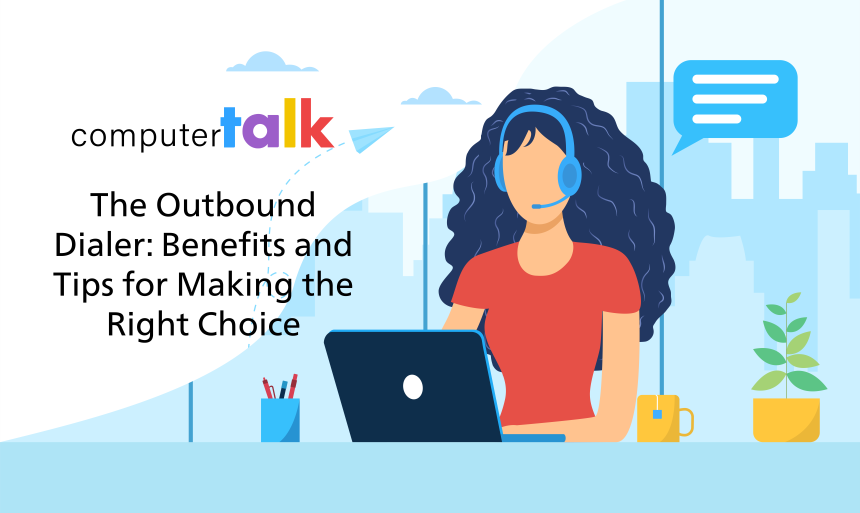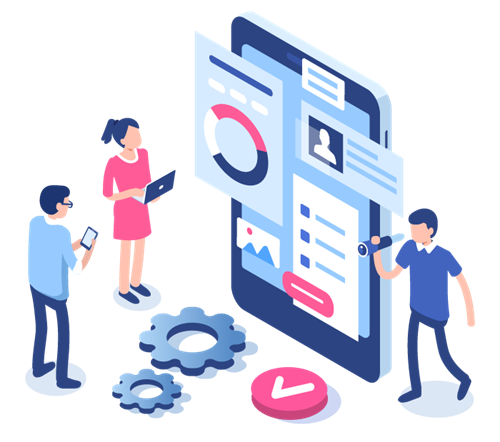Featured
The Outbound Dialer: Benefits and Tips for Making the Right Choice
by Nicole Robinson | Published On August 13, 2024

The outbound dialer is a valuable tool in many contact centers, revolutionizing how businesses manage customer communications. These dialing systems can rapidly connect customer service and sales agents with customers, increasing revenue and reducing agent idle time.
The right outbound dialer can deliver exceptional results to call centers, automating time-consuming tasks, improving operational efficiency, and even strengthening relationships with your target audience.
In this guide, we’ll introduce you to everything you need to know about outbound dialers, from the different types and how they work, to the advantages they can offer your team. We’ll also provide step-by-step guidance on how you can choose the right outbound dialing system for your team.
What is an Outbound Dialer and Why Do You Need One?
An outbound dialer is a software or cloud-based solution that allows companies to make outgoing calls efficiently. They help agents expedite and automate outbound calling to both prospects and customers.
Manual dialing can be a frustrating and time-consuming task in the call center. Not only do teams need to find and physically dial numbers themselves, but they’re often plagued with low connection rates, and frequently waste valuable time on customers that never pick up the phone.
An outbound dialer reduces some of the frustrations associated with manual dialing by automating the outreach process. Some intelligent solutions can instantly detect answering machines, ensuring they rapidly move onto the next number in a queue. They can also quickly and accurately dial multiple numbers at once, connecting agents only when a live person answers the call.
This significantly reduces idle time among team members, reduces the risk of human error, and allows agents to focus on what they do best: addressing issues and closing deals. Some studies even show that automatic dialers can increase agent talk time by up to 300%.
Outbound dialers aren’t just an effective way to connect with leads for sales. Countless industries use outbound dialers for different use cases. For instance, one school board uses ComputerTalk’s outbound dialer to notify parents of students of lockdowns, shutdowns, and snow days.
What Types of Outbound Dialers Are There?
Like many call center technologies, the outbound dialer has grown more advanced over time, introducing new ways for companies to improve efficiency and productivity. Some of the most popular dialing modes for these tools include:
Preview Dialers
Preview dialers allow users to retrieve information about the next prospect in a queue or campaign, then initiate a call with just one click. Users can control the exact rate at which calls are placed, and sometimes even surface information from integrated systems, like Customer Relationship Management (CRM) tools, so they can personalize each conversation.
Progressive Dialers
Progressive dialers, or power dialers automatically initiate calls for the next contact in a list as soon as an agent is available. This method of dialing helps to ensure a steady flow of calls for all agents, maximizing productivity and reducing downtime between interactions. Progressive dialing is an excellent choice for high-volume call centers.
Predictive Dialers
Predictive dialers use advanced, intelligent algorithms to anticipate when agents will be available. These systems automatically call a list of telephone numbers in sequence, often screening out non-answered calls, busy signals, disconnected numbers, and answering machines. When a live answer is recorded, the system connects the agent to the call.
Outbound IVR Dialers
Outbound IVR dialers deliver an automated outbound communication system that plays a message to a customer and then disconnects or plays prompts for a customer to follow. For instance, this system might contact a customer to let them know a new offer is available to them, then give them the option to press “0” to hear more, or “1” to speak to an agent.
What are the Key Benefits of an Outbound Dialer?
Although they may seem simple, outbound dialers can be transformative tools for businesses who need to optimize their outbound communication strategies. Some of the biggest advantages of an effective outbound dialer include:
Increased Efficiency
An outbound dialer automates the process of dialing numbers, reducing the time agents spend on less productive tasks. Instead of manually keying in each number and waiting for calls to connect, agents can focus more of their time on engaging and building relationships with prospects and customers. This leads to a more efficient work environment, allowing contact centers to accomplish more with less.
Improved Agent Productivity
By automating the dialing process, outbound dialers can enhance agent productivity and engagement. The right features, such as voicemail detection and automatic call distribution help to ensure agents only connect to live people, minimizing idle time. Some solutions can even surface valuable information prior to a call, which helps agents more effectively pitch products and serve customers.
Enhanced Call Connect Rates
Advanced outbound dialer technology can leverage sophisticated algorithms to detect voicemail or identify when agents end a previous call to connect them to a new one. This approach significantly boosts call connect rates, ensuring that agents are always connected to live calls as soon as they are available. Higher connection rates lead to more conversations and opportunities for sales or customer service interactions.
Better Call Management
Innovative outbound dialers can schedule calls, prioritize leads, manage call lists effectively, and even proactively communicate with clients and customers, sharing updates and insights. Some solutions can integrate with call recording software and AI-powered tools, creating call summaries, and updating database information, leading to better call management.
Increased Sales and Revenue
Since an outbound dialer delivers better connection rates, higher agent productivity, and better call management, it can also lead to increased sales and revenue. Agents reach more of the right prospects in less time, engage in more effective conversations, and close more deals. They also waste less time on calling the wrong numbers and are less likely to make dialing mistakes.
Real-time Monitoring and Reporting
Leading outbound dialers can offer valuable insights into business operations. With reporting and monitoring tools, managers can examine call quality, track agent performance in real-time, and track important data about connection and conversion rates. This allows companies to consistently improve and optimize their outbound strategy based on genuine data.
Enhanced Compliance
Compliance is an important consideration in any call or contact center. Outbound dialers are frequently equipped with features that help them ensure compliance with the Do Not Call list, and Telephone Consumer Protection Act (TCPA). They can also feature call recording capabilities, time zone management features and more, that reduce the risk of legal issues and fines.
Improved Personalization
Certain types of outbound dialer can integrate with crucial tools and systems, such as CRM tools, which allow agents to instantly access insights into a particular customer, their preferences, and their needs. This integration ensures agents can personalize each discussion they have with prospects, build stronger relationships, and deliver a consistent experience.
Scalability
Outbound dialers are designed to be inherently scalable. They can dial hundreds or thousands of numbers in a day, and easily manage increases in demand. Companies can even switch between different dialing strategies based on their specific needs and current workplace dynamics.
Cost Savings
By automating many aspects of the outbound calling process, outbound dialers help businesses save on operational costs. Reduced idle time, increased agent productivity, and better call management all contribute to lower overheads. Plus, the enhanced efficiency generated by outbound dialers can lead to a strong return on investment.
How to Choose the Best Outbound Dialer for Your Business
Choosing the right outbound dialer requires careful consideration of your business needs and objectives, as well as your existing technology stack. The right choice will enhance productivity, customer satisfaction, and efficiency, while a poor choice can lead to wasted resources.
Here are some key steps to take when assessing your options:
Assess Your Business Goals and Objectives
First, think about what you want to accomplish with your outbound dialer. Is your focus on delivering proactive service and ensuring customers are informed about outages or potential risks as quickly as possible, or are you trying to connect with more leads with high-volume cold calling?
You could also be using outbound dialers to send payment reminders to customers, keep them updated on loyalty program rewards, or issue surveys and collect insights.
Define the key performance indicators (KPIs) you’ll monitor when assessing the value of your outbound dialer, such as call handling times, call volumes, and conversion rates.
Consider your Target Audience
Your target market, or the audience you’re trying to reach with your outbound dialer technology will influence which solution you choose. If you’re communicating with customers in a highly regulated industry like finance or healthcare, for instance, you may need advanced security features and customizable policy controls for your outbound dialer.
You may also need to think about whether your outbound dialer needs to be able to adapt to suit different customers in varying locations. For instance, if you’re using an outbound IVR, you’d need to give an international audience multiple language options to choose from.
Gauge Your Technical and Operational Capabilities
Assessing your current technical infrastructure and operational capabilities is crucial to ensuring your outbound dialer integrates seamlessly with existing workflows. An effective outbound dialer should be able to integrate with your CRM system, to surface contact data and personal details.
It may also need to integrate with CRM software, like Salesforce, workforce management (WFM) tools, and other dedicated solutions throughout your organization. Think about the type of technology your agents will generally use alongside your outbound dialer in their daily workflows.
Assess Your Budget and Resources
The more advanced you need your outbound dialer to be, the more you may need to pay for your software. Some tools may require your employees to have specific skills, such as the ability to build their own automated workflows with your outbound dialing technology.
When assessing dialer options based on your budget and resources, remember to think carefully about the upfront cost of implementation, and the long-term benefits of implementing the right solution. Additionally, ask yourself whether there will be any ongoing costs associated with maintaining the dialer system and configuring it to suit your changing needs.
Evaluate Your Compliance Requirements
Compliance with the latest regulations is crucial when you’re running outbound campaigns, particularly on an international level. You’ll need to think carefully about the compliance regulations your business adheres to, such as TCPA, or GDPR mandates.
Assess the features each dialer option offers to ensure that you can avoid fines and legal repercussions. For instance, does it automatically track Do Not Call lists, offer access to comprehensive security measures, such as end-to-end encryption for recordings, and allow for custom access controls?
Other Considerations
Finally, it’s worth thinking about whether there are any additional features you might need to consider that would enhance the value of your outbound dialer. For instance, an option to schedule a callback with a client can be an excellent way to avoid missing out on crucial opportunities. The ability to access real-time displays of remaining prospects in a campaign can keep teams informed and motivated.
A flexible dialer system that can filter out incomplete phone numbers, automatically create reports, and even allow you to import and organize prospect lists can also be extremely valuable.
Unlocking Efficiency with the Right Outbound Dialer
An effective outbound dialer can be a valuable resource for any call center, whether you’re looking for ways to enhance proactive customer service, build better relationships with clients, or increase your conversion rates. With the right technology, you can boost productivity and efficiency, reduce waste in your call center, and streamline customer communications.
ComputerTalk’s iceCampaign solution gives companies all of the tools they need to build a proactive and customized communication strategy. It can blend inbound and outbound campaigns, support multiple advanced dialing modes, and even generate instant reports and insights.
Plus, our technology integrates with your existing resources, from CRM technologies to contact center platforms and workforce management tools.
Contact us today to learn more about our intuitive outbound dialer, or arrange a demo with one of our contact center experts.
More from our blog
 Before joining ComputerTalk, I worked at big tech companies — a great experience that taught me a lot and connected me with amazing people I still keep in touch with.
Before joining ComputerTalk, I worked at big tech companies — a great experience that taught me a lot and connected me with amazing people I still keep in touch with.
 Automated appointment reminders can help reduce no-shows in healthcare.
Automated appointment reminders can help reduce no-shows in healthcare.
16e46880-dade-4897-82a1-1cb60fce72fd.jpg?sfvrsn=52c67b05_1) At Enterprise Connect 2025, the evolving role of AI in customer experience (CX) took center stage. The event highlighted the importance of a holistic CX approach, where AI plays a key role in enhancing customer journeys.
At Enterprise Connect 2025, the evolving role of AI in customer experience (CX) took center stage. The event highlighted the importance of a holistic CX approach, where AI plays a key role in enhancing customer journeys.

